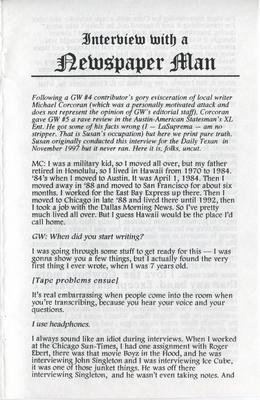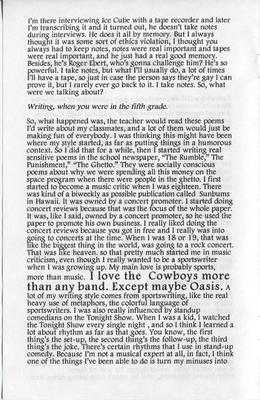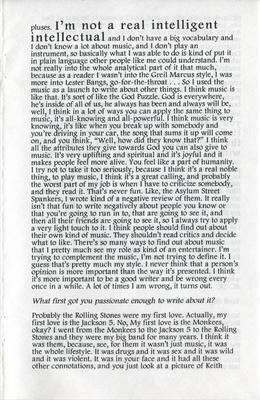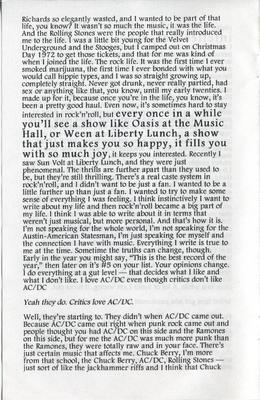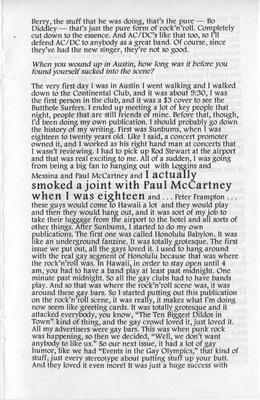Pages
11
Interview with a Newspaper Man
Following a GW #4 contributor's gory evisceration of local writer Michael Corcoran (which was a personally motivated attack and does not represent the opinion of GW's editorial staff), Corcoran gave GW #5 a rave review in the Austin-American Statesman's XL Ent. He got some of his facts wrong (I — LaSuprema — am no stripper. That is Susan's occupation) but here we print pure truth. Susan originally conducted this interview for the Daily Texan in November 1997 but it never ran. Here it is, folks, uncut.
MC: I was a military kid, so I moved all over, but my father retired in Honolulu, so I lived in Hawaii from 1970 to 1984. '84's when I moved to Austin. It was April 1, 1984. Then I moved away in '88 and moved to San Francisco for about six months. I worked for the East Bay Express up there. Then I moved to Chicago in late '88 and lived there until 1992, then I took a job with the Dallas Morning News. So I've pretty much lived all over. But I guess Hawaii would be the place I'd call home.
GW: When did you start writing?
I was going through some stuff to get ready for this — I was gonna show you a few things, but I actually found the very first thing I ever wrote, when I was 7 years old.
[Tape problems ensue]
It's real embarrassing when people come into the room when you're transcribing, because you hear your voice and your questions.
I use headphones.
I always sound like an idiot during interviews. When I worked at the Chicago Sun-Times, I had one assignment with Roger Ebert, there was that movie Boyz in the Hood, and he was interviewing John Singleton and I was interviewing Ice Cube, it was one of those junket things. He was off there interviewing Singleton, and he wasn't even taking notes. And
12
I'm there interviewing Ice Cube with a tape recorder and later I'm transcribing it and it turned out, he doesn't take notes during interviews. He does it all by memory. But I always thought it was some sort of ethics violation, I thought you always had to keep notes, notes were real important and tapes were real important, and he just had a real good memory. Besides, he's Roger Ebert, who's gonna challenge him? He's so powerful. I take notes, but what I'll usually do, a lot of the times I'll have a tape, so just in case the person says they're gay I can prove it, but I rarely ever go back to it. I take notes. So, what were we talking about?
Writing, when you were in the fifth grade.
So, what happened was, the teacher would read these poems I'd write about my classmates, and a lot of them would just be making fun of everybody. I was thinking this might have been where my style started, as far as putting things in a humorous context. So I did that for a while, then I started writing real sensitive poems in the school newspaper, "The Rumble," The Punishment," "The Ghetto." They were socially conscious poems about why we were spending all this money on the space program when there were people in the ghetto. I first started to become a music critic when I was eighteen. There was kind of a biweekly as possible publication called Sunbums in Hawaii It was owned by a concert promoter. I started doing concert reviews because that was the focus of the whole paper. It was, like I said, owned by a concert promoter, so he used the paper to promote his own business. I really liked doing the concert reviews because you got in free and I was really into going to concerts at the time. When I was 18 or 19, that was like the biggest thing in the world, was going to a rock concert. That was like heaven. so that pretty much started me in music criticism, even though I really wanted ti be a sportswriter when I was growing up. My main love is probably sports, more than music. I love the Cowboys more than any band. Except maybe Oasis. A lot of my writing style comes from sportswriting, like the real heavy use of metaphors, the colorful language of sportswriters. I was also really influenced by standup comedians on the Tonight Show. When I was a kid, I watched the Tonight Show every single night, and so I think I learned a lot about rhythm as far as that goes. You know, the first thing's the set-up, the second thing's the follow-up, the third thing's the joke. There's certain rhythms that I use in stand-up comedy. Because I'm not a musical expert at all, in fact, I think one of the things I've been able to do is turn my minutes into
13
pluses. I'm not a real intelligent intellectual and I don't have a big vocabulary and I don't know a lot about music, and I don't play an instrument , so basically what I was able to do is kind of put it in plain language other people like me could understand. I'm not really into the whole analytical part of it that much, because as a reader I wasn't into the Greil Marcus style, I was more into Lester Bangs, go-for the-throat . . . So I used the music as a launch to write about other things. I think music is like that. It's sort of like the God Puzzle. God is everywhere, he's inside of all of us, he always has been and always will be, well, I think in a lot of ways you can apply the same thing to music, it's all-knowing and all-powerful. I think music is very knowing, it's like when you break up with somebody and you're driving in your car, the song that sums it up will come on, and you think, "Well, how did they know that?" I think all the attributes they give towards God you can also give to music. It's very uplifting and spiritual and it's joyful and it makes people feel more alive. You feel like a part of humanity. I try not to take it too seriously, because I think it's a real noble thing, to play music, I think it's a great calling, and probably the worst part of my job is when I have to criticize somebody, and they read it. That's never fun. Like, the Asylum Street Spankers, I wrote a kind of a negative review of them. It really isn't that fun to write negatively about people you know or that you're going to run in to, that are going to see it, and then all their friends are going to see it, so I always try to apply a very light touch to it. I think people should find out about their own kind of music. They shouldn't read critics and decide what to like. There's so many ways to find out about music that I pretty much see my role as kind of an entertainer. I'm trying to complement the music, I'm not trying to define it. I guess that's pretty much my style. I never think that a person's opinion is more important than the way it's presented. I think it's more important to be a good writer and be wrong every once in a while. A lot of times I am wrong, it turns out.
What first got you passionate enough to write about it?
Probably the Rolling Stones were my first love. Actually, my first love is the Jackson 5. No, My first love is the Monkees, okay? I went from the Monkees to the Jackson 5 to the Rolling Stones and they were my big band for many years. I think it was them, because, see, for them it wasn't just music, it was the whole lifestyle. It was drugs and it was sex and it was wild and it was violent. It was in your face and it had all these other connotations, and you just look at a picture of Keith
14
Richards so elegantly wasted, and I wanted to be part of that life, you know? It wasn't so much the music, it was the life. And the Rolling Stones were the people that really introduced me to the life. I was a little bit young for the Velvet Underground and the Stooges, but I camped out on Christmas Day 1972 to get those tickets, and that for me was kind of when I joined the life. The rock life. It was the first time I ever smoked marijuana, the first time I ever bonded with what you would call hippie types, and I was so straight growing up, completely straight. Never got drunk, never really partied, had sex or anything like that, you know, until my early twenties. I made up for it, because once you're in the life, you know, it's been a pretty good haul. Even now, it's sometimes hard to stay interested in rock'n'roll, but every once in a while you'll see a show like Oasis at the Music Hall, or Ween at Liberty Lunch, a show that just makes you so happy, it fills you with so much joy, it keeps you interested. Recently I saw Sun Volt at Liberty Lunch, and they were just phenomenal. The thrills are further apart than they used to be, but they're still thrilling. There's a real caste system in rock'n'roll, and I didn't want to be just a fan. I wanted to be a little further up than just a fan. I wanted to try to make some sense of everything I was feeling. I think instinctively I want to write about my life and then rock'n'roll became a big part of my life. I think I was able to write about it in terms that weren't just musical, but were more personal. And that's how it is. I'm not speaking for the whole world, I'm not speaking for the Austin-American Statesman, I'm just speaking for myself and the connection I have with music. Everything I write is true to me at the time. Sometime the truths can change, though. Early in the year you might say, "This is the best record of the year," then later on it's #5 on your list. Your opinions change. I do everything at a gut level — that decides what I like and what I don't like. I love AC/DC even though critics don't like AC/DC
Yeah they do. Critics love AC/DC.
Well, they're starting to. They didn't when AC/DC came out. Because AC/DC came out right when punk rock came out and people thought you had AC/DC on this side and the Ramones on this side, but for me the AC/DC was much more punk than the Ramones, they were totally raw and in your face. There's just certain music that affects me. Chuck Berry, I'm more from that school, the Chuck Berry, AC/DC, Rolling Stones — just sort of like the jackhammer riffs and I think that Chuck
15
Berry, the stuff that he was doing, that's the pure — Bo Diddly — that's just the pure form of rock'n'roll. Completely cut down to the essence. And AC/DC's like that too, so I'll defend AC/DC to anybody as a great band. Of course, since they've had the new singer, they're not so good.
When you wound up in Austin, how long was it before you found yourself sucked into the scene?
The very first day I was in Austin I went walking down to the Continental Club, and it was about 9:30, I was the first person in the club, and it was a $3 cover to see the Butthole Surfers. I ended up meeting a lot of key people that are still friends of mine. Before that, though, I'd been doing my own publication. I should probably go down the history of my own writing. First was Sunbums, when I was eighteen to twenty years old. Like I said, a concert promoter owned it, and I worked as his right hand man at concerts that I wasn't reviewing. I had to pick up Rod Stewart at the airport and that was real exciting to me. All of a sudden, I was going from being a big fan to hanging out with Loggins and Messina and Paul McCartney and I actually smoked a joint with Paul McCartney when I was eighteen and . . . Peter Frampton . . . these guys would come to Hawaii a lot and they would play and then they would hang out, and it was sort of my job to take their luggage from the airport to the hotel and all sorts of other things. After Sunbums, I started to do my own publications. The first one was called Honolulu Babylon. It was like an underground fanzine. It was totally grotesque. The first issue we put out, all the gays loved it. I used to hang around with the real gay segment of Honolulu because that was where the rock'n'roll was. In Hawaii, in order to stay open until 4 am, you had to have a band play at least past midnight. One minute past midnight. So all the gay clubs had to have bands play. And so that was where the rock'n'roll scene was, it was around these gay bars. So I started putting out this publication on the rock'n'roll scene, it was really, it makes what I'm doing now seem like greeting cards. It was totally grotesque and it attacked everybody, you know, "The Ten Biggest Dildos in Town" kind of thing, and the gay crowd loved it, just loved it. All my advertisers were gay bars. This was when punk rock was happening, so then we decided, "Well, we don't want anybody to like us." So our next issue, it had a lot of gay humor, like we had "Events in the Gay Olympics," that kind of stuff, just every stereotype about putting stuff up your butt. And they loved it even more! It was just a huge success with
